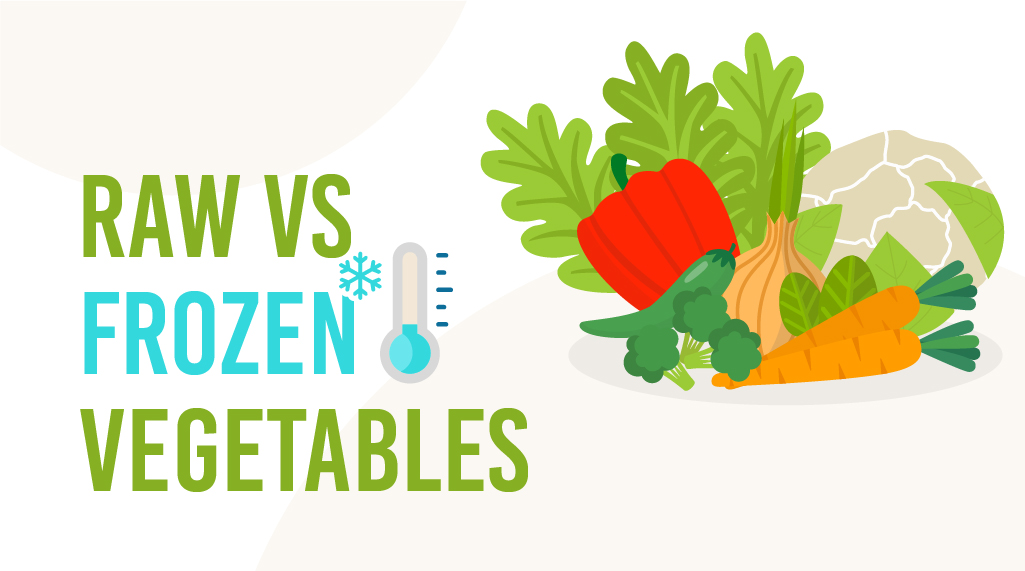Which are better and why?
By Roman Volchek
Now, at the time of COVID-19 disease spread, it’s extremely important to maintain your vitamins intake high to keep your immune system on point. And the best source of essential vitamins is, as you may have already guessed, vegetables. We normally have two options to choose from: raw and frozen, with former typically seen as a much better one. However, despite all myths and beliefs, it’s not always true and here is why.
Frozen vegetables are picked at their peak in terms of freshness and nutrients density
Vegetables that are made to be frozen are harvested at a time when their freshness and nutritional value are at their peak. Right after harvest, these vegetables are “blanched” and then frozen.
During blanching, vegetables are typically exposed to hot temperatures to kill off the bacteria. They could lose some vitamin B and C in the process, but for the most part, their nutritional value remains intact. General nutrient loss from blanching averages 10-20%. Freezing, contrary to popular beliefs, does not decrease their nutritional value, but simply helps to preserve it for a long time. Usually, no chemicals are added to produce before freezing.
Fresh vegetables are typically shipped from long distances making them less nutrient dense than frozen ones
Most fresh fruits and vegetables are picked before they are ripe. This allows them time to fully ripen during transportation. It also gives them less time to develop a full range of vitamins, minerals and natural antioxidants. In Canada and the US, fruits and vegetables may spend anywhere from 3 days to several weeks in transit before arriving at a distribution center. Shortly after harvesting, fresh fruits and vegetables start to lose moisture, have a greater risk of spoiling and drop in nutrient value. For example, green peas have been shown to lose up to 51% of their vitamin C during the first 24–48 hours after harvesting
Frozen vegetables can save you a lot of time
A mixed bag of frozen vegetables (peas, broccoli, corn, okra, carrots, etc.), for instance, can be used for a quick stir-fry. Soups and chilli are two easy recipes when cooking up your frozen veggies. They also save you time peeling, slicing and dicing.
Frozen vegetables are normally inexpensive and have a longer shelf life.
When it comes to planning your budget, frozen vegetables can save you money compared to fresh ingredients you find at the farmers market or in produce sections.
Additionally, they have a shelf life of approximately eight months so they are less likely to go bad if you forget about them, unlike the fresh ones. This can be really useful when you stock-up food for longer periods of time. Just make sure you do not eat vegetables that were frozen for longer than 1 year since that’s the point when the majority of nutrients start to break down.
However, despite all the facts I list above, raw vegetables have some advantages over frozen ones too.
Not all vegetables can be frozen
The ones you see in the freezer aisle have been selected for sale because of their flavour and texture retention characteristics in the frozen format. That’s why you don’t see frozen salad greens or frozen tomatoes at the grocery store. They won’t maintain the same flavour properties when frozen. Raw vegetables, therefore, offer you a wider range of nutrients because there are simply more options you can choose from.
Raw, seasonal vegetables from the farmer’s market offer you the most nutrients possible.
When it comes down to getting the most nutrients out of your vegetables, your best choice is going local. Farmer’s markets and locally sourced grocery stores can offer you seasonal vegetables that ensure you with the maximum nutrition benefits. These vegetables are harvested at their freshest and are not travelling long distances to get to you, meaning they are at their peak in terms of nutrients. However, you may not have access to such vegetables year-round based on seasonality, budget constraints and food allergies. In this case, frozen vegetables are a good option.
To sum up, here are 3 easy rules for you to remember when choosing what vegetables to eat:
- When the season is high (ex. late spring, summer, early fall) and you have enough money in your pocket, buy raw veggies from local food markets.
- When it’s not the season (ex. winter) and/or you are strapped on cash at the moment, buy frozen whatever you can and get the rest raw from produce areas.
- When the vegetables are shipped from afar – stick to frozen ones.
Yours in health,
Roman Volchek



